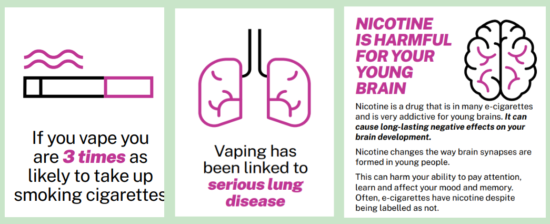
Fear, misinformation, and exaggeration: behind the SA-led national approach to youth vaping
Posted on December 19, 2022 By Colin
THE SOUTH AUSTRALIAN MINISTER FOR EDUCATION, Blair Boyer MP has proposed a national plan to reduce youth vaping in schools. This will include an advertising campaign to educate young people on the health impacts of vaping and address misinformation. So far so good.
Young people should not smoke or vape and should be provided with accurate information to make informed choices.
However, the Minister appears to have missed the irony that his very own youth education program is a glaring source of misinformation
Misinformation from SA Health
The SA Health website makes false claims, exaggerates the risks and provides misleading information about vaping.
It falsely claims that vaping has been linked to serious lung disease. No cases of serious lung disease have ever been linked to nicotine vaping. The outbreak of the lung condition EVALI in North America in 2019-20 was caused by vaping black-market cannabis oils adulterated with a cutting agent, Vitamin E Acetate.
The website states ‘If you vape you are 3 times as likely to take up smoking cigarettes’, implying that vaping causes kids to take up smoking (the 'gateway' theory). However, there is no evidence that vaping causes young people to take up smoking. In fact, vaping is having the opposite effect. Youth smoking rates are declining faster as vaping has increased.
It also claims that nicotine harms the developing brain. However this has only been demonstrated in rodents and there is no evidence of harm to humans.

It correctly states that e-cigarettes can contain harmful chemicals but fails to mention that the doses in vapour are only a small fraction of the levels in smoke and most are of little or no risk to health. It claims that a banned chemical diacetyl is linked to a serious lung disease (bronchiolitis obliterans or 'popcorn lung'). However, there has never been a case of this condition from vaping or smoking.
Furthermore, stating that 2 in 3 young people have tried vaping is meaningless without information about the frequency and duration of use and whether the users were already smokers. Most use by young people is experimental and transient and of very little public health importance. Regular use is mainly confined to smokers or would-be smokers. For them vaping is likely to be beneficial.
The black-market is the problem
The recent increase in youth vaping is due to Australia’s flawed prescription-only model which makes it extremely difficult for adults to get nicotine for vaping legally.
This has generated a thriving black-market to provide vapes to adult smokers. The same black-market also sells dodgy, unregulated vaping products freely to children.
Vapes should be sold as a strictly regulated adult consumer product (without a prescription) from licensed retail outlets with strict age verification as in all other western countries such as the UK and New Zealand.
The black-market would then no longer be profitable and easy access for kids would diminish
Vaping nicotine is an effective quitting aid for adult smokers and can be life-saving. It also is the most popular quitting aid in Australia. Vapes should not be harder to access than deadly cigarettes. There has not been a single death globally from vaping nicotine in the last 15 years, whereas eight million people die every year from smoking.
What young people need
Young people should be given accurate information about vaping so they can make informed decisions. They need to know that vaping is an adult quitting aid and is not for young people. Vaping is not risk-free, but it is much less harmful than smoking. While there is a risk of nicotine dependence in young non-smokers, there is so far very little evidence of harm, especially from short-term use.
Telling teens not to vape will only lead to more vaping, especially if the information provided is exaggerated and patently untrue
False and alarmist misinformation will undermine trust in health authorities. It will also mislead adult smokers and discourage them from switching to the safer alternative.
The proposed national vaping youth action plan smacks of a politically motivated, ill-considered, panicked knee-jerk reaction which will do more harm than good and may even trigger more curiosity about vaping. Mr Boyer should study the evidence and provide honest information to young people. There is no place for fear, misinformation, or exaggeration.